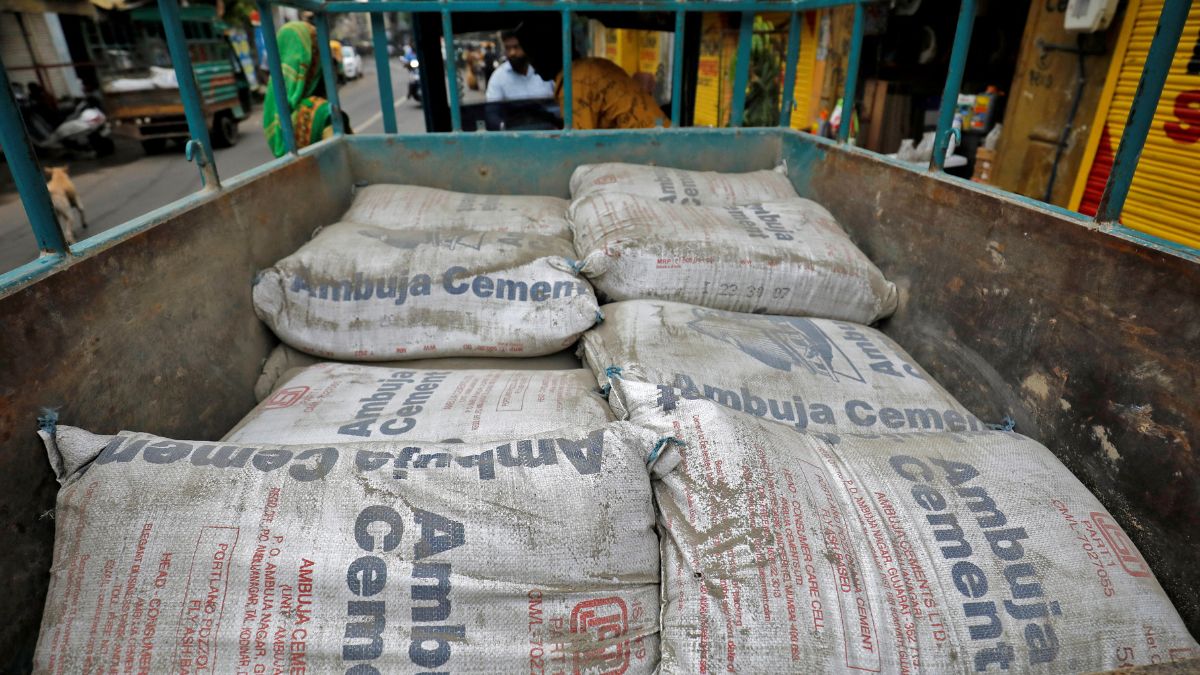Business
India markets show how tough they are! Nifty, Sensex bounce back despite third day of selling pressure- The Week

India stock market once again proves its mettle, powered by domestic investors. Benchmark indices are back to green, rebounding from Wednesday morning’s opening slide as it entered the third day of selling by foreign investors. Domestic institutional investors and firms continued their mantra of buying the drip, turning the market around.
In early trade, the BSE Sensex rallied by 168.79 points to 80,389.51, while the NSE Nifty climbed 46.2 points to 24,518.30. Banks such as HDFC and Kotak Mahindra, along with Bajaj Finserv, IT services giant TCS and automaker Maruti Suzuki were among the top gainers in morning trade.
Bajaj Finance stock inched up on its earnings after announcing a lacklustre 3 per cent lift in consolidated net profit hitting Rs 4,014 crore for the second quarter ended September 2024. Bajaj Finserv, HDFC Bank, Nestle, Kotak Mahindra Bank, Tata Consultancy Services, and Maruti were among the other big gainers. NTPC, UltraTech, and Mahindra and Mahindra were among the scripts that fell behind.
“The ongoing trend of largecaps outperforming mid and smallcaps is likely to sustain, going forward. FII selling and the countervailing trend of DII buying is likely to continue. This will impart strength to largecap financials, particularly banking stocks like HDFC, ICICI, Axis and Kotak which are fairly valued in this market with elevated valuations,”said V K Vijayakumar, Chief Investment Strategist, Geojit Financial Services.
ALSO READ: There is need for greater financial discipline by states, says Amitabh Kant
According to the NSE, Domestic Institutional Investors (DIIs) bought equities worth Rs 5,869.06 crore on Tuesday, despite foreign investors offloading a massive Rs 3,978.61 crore following global factors. Chinese recovery was further bolstered by Shanghai and Hong Kong trading higher. Among the other Asian markets, Seoul was up, but Tokyo was down. On Tuesday, the BSE benchmark slipped 930.55 points or 1.15 per cent to 80,220.72, while the NSE Nifty fell 309 points or 1.25 per cent to 24,472.10. The Indian rupee was nearly flat at 84.0675 versus the US dollar.
ALSO READ: Netflix stock continues to climb on impressive earnings, hit content from countries like India
Banking and market expert Ajay Bagga sees India to represent “the biggest opportunity to deliver growth, at massive scale in the world, for the next two decades.”
“We can’t control global events, though we know the extreme market reactions that follow. Given that recoveries are also very sharp and concentrated into a few days, the bigger risk is that of being out of the markets,”added Bagga, as India’s local investors and organisations went on a buying spree in the past few days, offsetting the offload by foreign investors.
Travel
Staycity to open Wilde aparthotel in Oxford
The 145-room property will be built on the site of a former Odeon cinema on the city’s George Street
Continue reading Staycity to open Wilde aparthotel in Oxford at Business Traveller.
Business
Investing in Argentina
The election of Javier Milei has excited investors and raised spirits in the business community. But can Milei deliver on his promises and overcome congressional resistance to deliver the big changes the country needs to return to growth?
Money
Hundreds of households to get a direct payment to bank accounts worth £100s – are you eligible ?

HUNDREDS of struggling households could receive direct payments worth hundreds of pounds into their bank accounts this winter.
The cash support is available through the government’s Household Support Fund (HSF).
Earlier this month, the government extended the scheme for the sixth time, releasing £421 million to be distributed among councils.
This funding will be allocated to vulnerable residents from now until March 2025.
Each local authority gets a different proportion of cash depending on the size of the catchment area, population, and number of vulnerable households.
This means the voucher or grants on offer will vary by location, so you must check to see what you can get and how your council will pay you.
For example, struggling residents and families who live in Torridge can apply for free cash grants directly to bank accounts worth £100s.
These grants can be used to help households with their energy and water bills.
Others may be eligible for cash vouchers to be spent on food at their local supermarket.
Torridge Council says that the fund can also be used to help hard-up households pay for new white goods, including fridges, freezers, ovens and slow cookers.
It added that in exceptional circumstances, the fund could also help those with emergency housing costs.
During the previous round of the council’s Household Support Fund, the local authority assisted 247 individuals after receiving £192,000 from the central government.
In the scheme’s sixth round, Torridge District Council has been allocated £210,000 to distribute to residents most in need.
To be eligible for the latest round of funding, you must be experiencing some form of financial hardship.
To find out more and apply, visit bpag-encompass.org.uk/projects/torridge-household-fund/.
As part of the application, you’ll need to include your name, email address and National Insurance number.
You’ll also be expected to explain what type of support you require and a detailed description of your financial situation.
What if I don’t live in Torridge?
What you can get depends on where you live and what support is available.
Each local council receives a portion of the £421million fund, which is then distributed to residents based on need.
Some councils may provide direct cash payments, while others issue vouchers to help cover essentials like energy or food.
How the money is distributed will vary, so it’s important to check with your local authority.
For example, Birmingham City Council has announced £200 payments to help residents with winter costs.
Other councils, like Coventry, have offered community supermarket schemes, where households can pay £5 a week and get a basket of food worth up to £25.
However, there are changes to the scheme this time around.
Some councils have introduced monthly caps on funding, meaning once the allocated amount for the month is spent, applications are paused until the following month.
This is to ensure that everyone has a chance to receive support, but it does mean you should apply as soon as possible.
Who’s generally eligible for the scheme?
The Household Support Fund is designed to help households in financial difficulty, particularly those on low incomes or those who don’t qualify for other forms of government assistance.
If you’re struggling to make ends meet due to rising living costs, you could be eligible for support.
The criteria you need to meet will vary depending on where you live.
You’ll likely need to prove your financial hardship when applying.
This can include showing evidence of your income, benefits or other forms of support you’re currently receiving.
For example, if you’re receiving Universal Credit or a council tax reduction, you could qualify.
But even if you’re not on benefits, you may still be able to get help if you can demonstrate financial hardship.
HOUSEHOLD SUPPORT FUND EXPLAINED
SUN Savers Editor Lana Clements explains what you need to know about the Household Support Fund.
If you’re battling to afford energy and water bills, food or other essential items and services, the Household Support Fund can act as a vital lifeline.
The financial support is a little-known way for struggling families to get extra help with the cost of living.
Every council in England has been given a share of £421million cash by the government to distribute to local low income households.
Each local authority chooses how to pass on the support. Some offer vouchers whereas others give direct cash payments.
In many instances, the value of support is worth hundreds of pounds to individual families.
Just as the support varies between councils, so does the criteria for qualifying.
Many councils offer the help to households on selected benefits or they may base help on the level of household income.
The key is to get in touch with your local authority to see exactly what support is on offer.
And don’t delay, the scheme has been extended until April 2025 but your council may dish out their share of the Household Support Fund before this date.
Once the cash is gone, you may find they cannot provide any extra help so it’s crucial you apply as soon as possible.
Do I need to apply?
Applications for the Household Support Fund are handled by your local council, and the process can vary depending on where you live.
Most councils offer online application forms, but if you need help completing an application, you can call your council’s customer service centre for assistance.
To apply, you’ll need to provide details such as your National Insurance number and may need to submit bank statements or benefit evidence.
If you’re applying for a family member or someone else, there’s also an option to upload supporting documents like benefit letters or pay slips to prove eligibility.
Some councils, such as Haringey, are issuing automatic payments to eligible residents, while others require residents to apply directly.
If you’re unsure of the process in your area, it’s best to check your local council’s website.
Are you missing out on benefits?
YOU can use a benefits calculator to help check that you are not missing out on money you are entitled to
Charity Turn2Us’ benefits calculator works out what you could get.
Entitledto’s free calculator determines whether you qualify for various benefits, tax credit and Universal Credit.
MoneySavingExpert.com and charity StepChange both have benefits tools powered by Entitledto’s data.
You can use Policy in Practice’s calculator to determine which benefits you could receive and how much cash you’ll have left over each month after paying for housing costs.
Your exact entitlement will only be clear when you make a claim, but calculators can indicate what you might be eligible for.
Business
Adani-owned Ambuja acquires Orient Cement stake from CK Birla Group- The Week

Gautam Adani, who entered the cement business through the acquisition of ACC and Ambuja from Holcim back in 2022, has added Orient Cement to his kitty amid a high stakes battle for sector leadership between the Adani Group and Kumar Mangalam Birla-led Aditya Birla Group.
Ambuja Cements has signed a binding agreement for the acquisition of Orient Cement (OCL) at an equity value of Rs 8,100 crore. Ambuja will acquire 46.8 per cent shares of OCL from its current promoters (CK Birla Group) and certain public shareholders.
“This timed acquisition marks another significant step forward in Ambuja Cements’ accelerated growth journey, increasing cement capacity by 30 million tons per annum (MTPA) within two years of Ambuja’s acquisition,” said Karan Adani, director of Ambuja Cements.
By acquiring OCL, Ambuja is poised to reach 100 MTPA cement capacity in the current financial year noted Adani.
“The acquisition will help to expand Adani Cement’s presence in core markets and improve its pan-India market share by 2 per cent,” he added.
Earlier, Ambuja had acquired Penna Cement Industries.
CK Birla, the chairman of Orient Cement, pointed that the group is continuously reallocating capital as it looks to sharpen its focus on consumer centric, technology driven and service-based businesses.
OCL has 5.6 MTPA clinker capacity and 8.5 MTPA cement capacity along with statutory clearance to increase the clinker capacity by another 6.0 MTPA and cement capacity by another 8.1 MTPA. Additionally, OCL also has a limestone mining lease in Chittorgarh, Rajasthan for setting up an integrated unit (with clinker of 4 MTPA and a split grinding unit of 6 MTPA in North India.
The Aditya Birla Group, whose UltraTech is the market leader in the cement industry has also been strengthening its position. Earlier this year, UltraTech acquired a stake in India Cements.
In 2023, UltraTech had acquired the cement business of Kesoram Industries. With the acquisitions and it’s own expansion, UltraTech’s cement capacity will surpass 200 MTPA by financial year 2027, Chairman Kumar Mangalam Birla had said earlier this year at the company’s annual general meeting.
Sajjan Jindal-led JSW Cement too has been exploring acquisitions to grow its cement and was also reportedly in the race to buy the Orient Cement stake.
JSW Cement had filed papers earlier this year to raise around Rs 4,000 crore via an initial public offering. The issue was put on hold by market regulator SEBI in September.
On Tuesday, Orient Cement shares were 2.3 per cent lower at Rs 344.25 on the BSE in noon trading. Ambuja Cements was down 1.6 per cent at Rs 563. UltraTech was up 0.6 per cent at Rs 10,938.95.
Business
F&O trading can’t be a national pastime, says SEBI member Ashwani Bhatia- The Week

Over the last few years, the number of Indians investing in the stock market has grown considerably. From around 4.1 crore at the start of the Covid-19 pandemic in 2020, the number of demat accounts jumped to 17.5 crore as of September 2024. At the same time, volumes in the derivatives market have jumped too, something the Securities and Exchange Board of India (SEBI) is not too happy about.
The market regulator had earlier this month tightened rules for trading in futures and options market. In the Union Budget this year, the STT (Securities Transactions Tax) was also raised on F&O trading.
On Tuesday, Ashwani Bhatia, a full-time member of SEBI, reiterated the regulator’s warning that over-exuberance in F&O market could hurt retail investors and they would rather do serious investing.
“India accounts for the largest volume of F&O globally. We are number one and globally also more than 50 per cent of the F&O volume happens in India. This is a crown we do not wish to wear. F&O cannot be and should not be a national pastime,” Bhatia said speaking at the 14th Morningstar Investment Conference in Mumbai.
He noted that in the past three years, there had been losses of as much as Rs 1.80 lakh crore and 93 per cent of the investors had lost money.
“Your odds are terrible,” stressed Bhatia.
He felt Indians should rather invest and participate in wealth creation happening across the country.
“Mutual funds are one of the most stable and diverse investing options available to retail investors. In just five years, the mutual fund industry assets under management have increased from Rs. 23.8 lakh crore in March 2020 to the current level of Rs. 67.1 lakh crore as of the end of September 24,” he pointed out.
Money coming via monthly SIPs (systematic investment plan) is now Rs 24,509 crore, he noted, but stated that there was a long way to go.
“The global average AUM to GDP is about 60-70 per cent and the fact that we are at about 20 per cent currently tells us that we have some way to travel,” said Bhatia.
He also reiterated SEBI’s concerns over the surge in the SME (small and medium enterprises) IPO market.
“SME listings are closely monitored by exchanges and SEBI to ensure they do not engage in irrational exuberance, price manipulation or fraudulent trade practices,” said Bhatia.
The way retail participation is happening, the number of times IPO issues are oversubscribed, the way market making happens, the way underwriting happens and obviously they did not feel very comfortable about what was going on, he said.
There has been a huge rise in SME IPOs over the past year, with a few IPOs getting significantly more interest than the issue size. The regulator has also passed orders against a few SMEs in the recent past.
Bhatia advised retail investors to be extremely careful while investing in SME IPOs.
Travel
Singapore Airlines and Air India add 51 new codeshare destinations
This marks the first extensive expansion of codeshare arrangements between the airlines since 2010
-

 Science & Environment1 month ago
Science & Environment1 month agoHyperelastic gel is one of the stretchiest materials known to science
-

 Technology4 weeks ago
Technology4 weeks agoIs sharing your smartphone PIN part of a healthy relationship?
-

 Science & Environment1 month ago
Science & Environment1 month ago‘Running of the bulls’ festival crowds move like charged particles
-

 Science & Environment1 month ago
Science & Environment1 month agoHow to unsnarl a tangle of threads, according to physics
-

 Science & Environment1 month ago
Science & Environment1 month agoMaxwell’s demon charges quantum batteries inside of a quantum computer
-

 Technology1 month ago
Technology1 month agoWould-be reality TV contestants ‘not looking real’
-

 Science & Environment4 weeks ago
Science & Environment4 weeks agoX-rays reveal half-billion-year-old insect ancestor
-

 Science & Environment1 month ago
Science & Environment1 month agoSunlight-trapping device can generate temperatures over 1000°C
-

 Science & Environment1 month ago
Science & Environment1 month agoLiquid crystals could improve quantum communication devices
-

 Science & Environment1 month ago
Science & Environment1 month agoQuantum ‘supersolid’ matter stirred using magnets
-

 Womens Workouts4 weeks ago
Womens Workouts4 weeks ago3 Day Full Body Women’s Dumbbell Only Workout
-

 Technology3 weeks ago
Technology3 weeks agoUkraine is using AI to manage the removal of Russian landmines
-

 TV3 weeks ago
TV3 weeks agoসারাদেশে দিনব্যাপী বৃষ্টির পূর্বাভাস; সমুদ্রবন্দরে ৩ নম্বর সংকেত | Weather Today | Jamuna TV
-

 Science & Environment1 month ago
Science & Environment1 month agoLaser helps turn an electron into a coil of mass and charge
-

 Science & Environment1 month ago
Science & Environment1 month agoWhy this is a golden age for life to thrive across the universe
-

 Science & Environment1 month ago
Science & Environment1 month agoA new kind of experiment at the Large Hadron Collider could unravel quantum reality
-

 Science & Environment1 month ago
Science & Environment1 month agoQuantum forces used to automatically assemble tiny device
-

 News3 weeks ago
News3 weeks agoMassive blasts in Beirut after renewed Israeli air strikes
-

 News2 weeks ago
News2 weeks agoNavigating the News Void: Opportunities for Revitalization
-

 Football3 weeks ago
Football3 weeks agoRangers & Celtic ready for first SWPL derby showdown
-

 Science & Environment1 month ago
Science & Environment1 month agoA slight curve helps rocks make the biggest splash
-

 Science & Environment1 month ago
Science & Environment1 month agoNerve fibres in the brain could generate quantum entanglement
-

 Science & Environment1 month ago
Science & Environment1 month agoHow to wrap your mind around the real multiverse
-

 Science & Environment1 month ago
Science & Environment1 month agoITER: Is the world’s biggest fusion experiment dead after new delay to 2035?
-

 News1 month ago
News1 month ago▶️ Hamas in the West Bank: Rising Support and Deadly Attacks You Might Not Know About
-

 MMA3 weeks ago
MMA3 weeks agoJulianna Peña trashes Raquel Pennington’s behavior as champ
-
Business3 weeks ago
DoJ accuses Donald Trump of ‘private criminal effort’ to overturn 2020 election
-

 Business3 weeks ago
Business3 weeks agoWhen to tip and when not to tip
-

 News1 month ago
News1 month ago▶️ Media Bias: How They Spin Attack on Hezbollah and Ignore the Reality
-

 Science & Environment1 month ago
Science & Environment1 month agoNuclear fusion experiment overcomes two key operating hurdles
-

 Science & Environment1 month ago
Science & Environment1 month agoTime travel sci-fi novel is a rip-roaringly good thought experiment
-

 Technology3 weeks ago
Technology3 weeks agoMicrophone made of atom-thick graphene could be used in smartphones
-

 Technology3 weeks ago
Technology3 weeks agoSamsung Passkeys will work with Samsung’s smart home devices
-

 News2 weeks ago
News2 weeks ago▶ Hamas Spent $1B on Tunnels Instead of Investing in a Future for Gaza’s People
-

 MMA2 weeks ago
MMA2 weeks ago‘Uncrowned queen’ Kayla Harrison tastes blood, wants UFC title run
-

 MMA3 weeks ago
MMA3 weeks agoPereira vs. Rountree prediction: Champ chases legend status
-

 Sport3 weeks ago
Sport3 weeks agoBoxing: World champion Nick Ball set for Liverpool homecoming against Ronny Rios
-

 Sport3 weeks ago
Sport3 weeks agoWales fall to second loss of WXV against Italy
-

 Science & Environment1 month ago
Science & Environment1 month agoPhysicists have worked out how to melt any material
-
News1 month ago
the pick of new debut fiction
-

 News1 month ago
News1 month agoOur millionaire neighbour blocks us from using public footpath & screams at us in street.. it’s like living in a WARZONE – WordupNews
-

 Technology4 weeks ago
Technology4 weeks agoWhy Machines Learn: A clever primer makes sense of what makes AI possible
-

 Technology1 month ago
Technology1 month agoMeta has a major opportunity to win the AI hardware race
-

 Technology3 weeks ago
Technology3 weeks agoMusk faces SEC questions over X takeover
-

 Sport3 weeks ago
Sport3 weeks agoWorld’s sexiest referee Claudia Romani shows off incredible figure in animal print bikini on South Beach
-

 Technology3 weeks ago
Technology3 weeks agoThe best budget robot vacuums for 2024
-

 Sport3 weeks ago
Sport3 weeks agoMan City ask for Premier League season to be DELAYED as Pep Guardiola escalates fixture pile-up row
-

 MMA3 weeks ago
MMA3 weeks agoDana White’s Contender Series 74 recap, analysis, winner grades
-

 News3 weeks ago
News3 weeks agoFamily plans to honor hurricane victim using logs from fallen tree that killed him
-

 Sport3 weeks ago
Sport3 weeks agoCoco Gauff stages superb comeback to reach China Open final
-

 Technology3 weeks ago
Technology3 weeks agoThis AI video generator can melt, crush, blow up, or turn anything into cake
-

 News3 weeks ago
News3 weeks agoGerman Car Company Declares Bankruptcy – 200 Employees Lose Their Jobs
-

 Technology3 weeks ago
Technology3 weeks agoTexas is suing TikTok for allegedly violating its new child privacy law
-

 Sport3 weeks ago
Sport3 weeks agoSturm Graz: How Austrians ended Red Bull’s title dominance
-

 Money3 weeks ago
Money3 weeks agoWetherspoons issues update on closures – see the full list of five still at risk and 26 gone for good
-

 MMA3 weeks ago
MMA3 weeks agoPereira vs. Rountree preview show live stream
-

 News2 weeks ago
News2 weeks agoHeavy strikes shake Beirut as Israel expands Lebanon campaign
-

 TV2 weeks ago
TV2 weeks agoLove Island star sparks feud rumours as one Islander is missing from glam girls’ night
-
Business3 weeks ago
Bank of England warns of ‘future stress’ from hedge fund bets against US Treasuries
-

 Business3 weeks ago
Business3 weeks agoChancellor Rachel Reeves says she needs to raise £20bn. How might she do it?
-

 MMA3 weeks ago
MMA3 weeks agoAlex Pereira faces ‘trap game’ vs. Khalil Rountree
-

 News3 weeks ago
News3 weeks agoHeartbreaking end to search as body of influencer, 27, found after yacht party shipwreck on ‘Devil’s Throat’ coastline
-
Business3 weeks ago
Sterling slides after Bailey says BoE could be ‘a bit more aggressive’ on rates
-

 News3 weeks ago
News3 weeks ago‘Blacks for Trump’ and Pennsylvania progressives play for undecided voters
-

 Science & Environment1 month ago
Science & Environment1 month agoPhysicists are grappling with their own reproducibility crisis
-

 Football3 weeks ago
Football3 weeks agoSimo Valakari: New St Johnstone boss says Scotland special in his heart
-

 TV3 weeks ago
TV3 weeks agoPhillip Schofield accidentally sets his camp on FIRE after using emergency radio to Channel 5 crew
-

 News3 weeks ago
News3 weeks agoWoman who died of cancer ‘was misdiagnosed on phone call with GP’
-

 MMA3 weeks ago
MMA3 weeks agoUFC 307 preview show: Will Alex Pereira’s wild ride continue, or does Khalil Rountree shock the world?
-

 Technology3 weeks ago
Technology3 weeks agoThe best shows on Max (formerly HBO Max) right now
-

 Science & Environment3 weeks ago
Science & Environment3 weeks agoMarkets watch for dangers of further escalation
-

 Technology3 weeks ago
Technology3 weeks agoJ.B. Hunt and UP.Labs launch venture lab to build logistics startups
-

 Sport3 weeks ago
Sport3 weeks agoChina Open: Carlos Alcaraz recovers to beat Jannik Sinner in dramatic final
-

 TV3 weeks ago
TV3 weeks agoMaayavi (මායාවී) | Episode 23 | 02nd October 2024 | Sirasa TV
-

 Technology3 weeks ago
Technology3 weeks agoPopular financial newsletter claims Roblox enables child sexual abuse
-

 News3 weeks ago
News3 weeks agoHull KR 10-8 Warrington Wolves – Robins reach first Super League Grand Final
-

 Technology3 weeks ago
Technology3 weeks agoOpenAI secured more billions, but there’s still capital left for other startups
-
Business3 weeks ago
Head of UK Competition Appeal Tribunal to step down after rebuke for serious misconduct
-
Business3 weeks ago
The search for Japan’s ‘lost’ art
-

 Sport3 weeks ago
Sport3 weeks agoAaron Ramsdale: Southampton goalkeeper left Arsenal for more game time
-

 News3 weeks ago
News3 weeks agoBalancing India and China Is the Challenge for Sri Lanka’s Dissanayake
-

 Entertainment3 weeks ago
Entertainment3 weeks ago“Golden owl” treasure hunt launched decades ago may finally have been solved
-

 Science & Environment1 month ago
Science & Environment1 month agoA tale of two mysteries: ghostly neutrinos and the proton decay puzzle
-
Business4 weeks ago
Eurosceptic Andrej Babiš eyes return to power in Czech Republic
-

 Sport1 month ago
Sport1 month agoJoshua vs Dubois: Chris Eubank Jr says ‘AJ’ could beat Tyson Fury and any other heavyweight in the world
-
News1 month ago
The Project Censored Newsletter – May 2024
-

 Technology4 weeks ago
Technology4 weeks agoArtificial flavours released by cooking aim to improve lab-grown meat
-

 Technology3 weeks ago
Technology3 weeks agoUniversity examiners fail to spot ChatGPT answers in real-world test
-

 Technology3 weeks ago
Technology3 weeks agoEpic Games CEO Tim Sweeney renews blast at ‘gatekeeper’ platform owners
-

 News3 weeks ago
News3 weeks agoLiverpool secure win over Bologna on a night that shows this format might work
-

 Technology3 weeks ago
Technology3 weeks agoMicrosoft just dropped Drasi, and it could change how we handle big data
-

 Technology3 weeks ago
Technology3 weeks agoApple iPhone 16 Plus vs Samsung Galaxy S24+
-

 Health & fitness3 weeks ago
Health & fitness3 weeks agoNHS surgeon who couldn’t find his scalpel cut patient’s chest open with the penknife he used to slice up his lunch
-

 Technology3 weeks ago
Technology3 weeks agoHow to disable Google Assistant on your Pixel Watch 3
-

 Money3 weeks ago
Money3 weeks agoPub selling Britain’s ‘CHEAPEST’ pints for just £2.60 – but you’ll have to follow super-strict rules to get in
-
Business3 weeks ago
Can liberals be trusted with liberalism?
-

 Technology3 weeks ago
Technology3 weeks agoA very underrated horror movie sequel is streaming on Max
-

 MMA3 weeks ago
MMA3 weeks agoKetlen Vieira vs. Kayla Harrison pick, start time, odds: UFC 307
-

 MMA3 weeks ago
MMA3 weeks agoHow to watch Salt Lake City title fights, lineup, odds, more
-

 Technology3 weeks ago
Technology3 weeks agoAmazon’s Ring just doubled the price of its alarm monitoring service for grandfathered customers




You must be logged in to post a comment Login